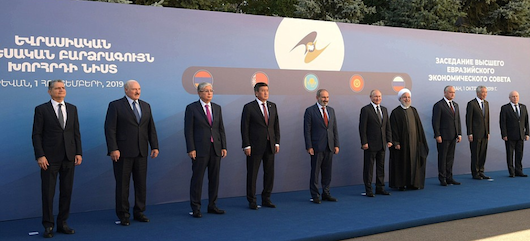Trans-Caspian Forum on Capitol Hill
The Trans-Caspian East-West Trade and Transit Corridor is a regional integrator, trade facilitator and viable transit connector between Europe and Asia. Comprising of Azerbaijan, Georgia and Turkey to the west, and Kazakhstan, Turkmenistan Uzbekistan and Afghanistan to the east of the Caspian Sea, this corridor brings together more than 200 million strong market and 400 billion in overall trade while connecting economies of the European Union and China along with access to Russia, Iran, Pakistan and India.
The Central Asia-Caucasus Institute invites you to join members of Congress, Congressional Staff and the delegates from the Trans-Caspian countries, to discuss emerging geopolitical importance of the bourgeoning energy and transportation network, as well as U.S. commercial interests arising from it.
Speakers:
Dr. Mohammad Humayon Qayoumi - Chief Advisor of the President of Afghanistan
Mr. Elmir Valizade - Deputy Minister of Transport and Communication, Azerbaijan
Mr. Genadi Arveladze - Deputy Minister of Economy and Sustainable Development, Georgia
Mr. Fatih Metin, Deputy Minister of Economy, Turkey
Deputy Minister of Investment, Kazakhstan (name TBC)
Moderator: Fred Starr, Chairman, Central-Asia Caucasus Institute at AFPC
Where: Rayburn House Office Building, Room 2167, 45 Independence Ave. SW 20515
When: Monday, May 17, 2018 from 9:30 am - 11:00 am
RSVP: Click HERE to register





 What should be the United States’ strategy towards Central Asia, the Caucasus, and the region of Greater Central Asia (GCA) as a whole? Should it even have one? Unlike most other world regions, these lands did not figure in US policy until the collapse of the USSR in 1991. Though the new Baltic states entered Washington’s field of vision in that year, in those cases the Department of State could recall and build upon America’s relations with independent Estonia, Latvia, and Lithuania during the inter-war decades. For the US Government after 1991, GCA was defined less as sovereign states than as a group of “former Soviet republics” that continued to be perceived mainly through a Russian lens, if at all.
What should be the United States’ strategy towards Central Asia, the Caucasus, and the region of Greater Central Asia (GCA) as a whole? Should it even have one? Unlike most other world regions, these lands did not figure in US policy until the collapse of the USSR in 1991. Though the new Baltic states entered Washington’s field of vision in that year, in those cases the Department of State could recall and build upon America’s relations with independent Estonia, Latvia, and Lithuania during the inter-war decades. For the US Government after 1991, GCA was defined less as sovereign states than as a group of “former Soviet republics” that continued to be perceived mainly through a Russian lens, if at all.